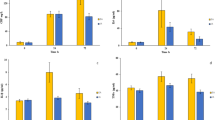Abstract
Background
The aim of this trial was to compare the Enhanced Recovery After Surgery (ERAS) program with conventional perioperative management in patients who underwent radical resection for colorectal cancer.
Methods
A combination of evidence-based and consensus methodology was used to develop the ERAS protocol. Five hundred ninety-seven consecutive patients who underwent elective colorectal resection were randomized to either the ERAS (n = 299) or the control group (n = 298). Outcomes relating to nutrition and metabolism index, stress index, and recovery index were measured and recorded.
Results
Demographic and operative data were similar between the two groups. Patients in the ERAS group showed improved nutritional status when compared with those of the control group. On postoperative day (POD) 1, the HOMA-IR (insulin resistance index) of the ERAS group was lower than that of the control group (p < 0.001). The cortisol level of the control group was elevated on both POD 1 (p = 0.007) and POD 5 (p = 0.002) compared to the preoperative level. However, the cortisol level of the ERAS group was not increased until POD 5 (p = 0.001). Reduced levels of TNF-α, IL-1β, IL-6, and IFN-γ in the ERAS group indicated less postoperative stress responses. In addition, ERAS was associated with accelerated recovery of gastrointestinal function. The postoperative length of stay (p < 0.001) and expense (p < 0.001) for the ERAS group were reduced in comparison to the controls. Twenty-eight cases in the control group and twenty-nine in the ERAS group suffered complications, which was not significantly different.
Conclusion
The ERAS protocol attenuates the surgical stress response and accelerates postoperative recovery without compromising patient safety.


Similar content being viewed by others
References
Lassen K, Hannemann P, Ljungqvist O et al (2005) Patterns in current perioperative practice: survey of colorectal surgeons in five northern European countries. BMJ 330(9):1420–1421
Kehlet H (2008) Fast-track colorectal surgery. Lancet 371(9615):791–793
Kehlet H, Wilmore DW (2002) Multimodal strategies to improve surgical outcome. Am J Surg 183(3):630–641
Nygren J, Hausel J, Kehlet H et al (2005) A comparison in five European Centres of case mix, clinical management and outcomes following either conventional or fast-track perioperative care in colorectal surgery. Clin Nutr 24(3):455–461
Wind J, Polle SW, Fung Kon Jin PH et al (2006) Systematic review of enhanced recovery programmes in colonic surgery. Br J Surg 93(7):800–809
Varadhan KK, Neal KR, Dejong CH et al (2010) The enhanced recovery after surgery (ERAS) pathway for patients undergoing major elective open colorectal surgery: a meta-analysis of randomized controlled trials. Clin Nutr 29(4):434–440
Fearon KC, Ljungqvist O, Von Meyenfeldt M et al (2005) Enhanced recovery after surgery: a consensus review of clinical care for patients undergoing colonic resection. Clin Nutr 24(3):466–477
Lassen K, Soop M, Nygren J et al (2009) Consensus review of optimal perioperative care in colorectal surgery: Enhanced Recovery After Surgery (ERAS) Group recommendations. Arch Surg 144(10):961–969
Brady M, Kinn S, Stuart P (2003) Preoperative fasting for adults to prevent perioperative complications. Cochrane Database Syst Rev (4):CD004423
Ljungqvist O, Nygren J, Thorell A et al (2001) Preoperative nutrition — elective surgery in the fed or the overnight fasted state. Clin Nutr 20(Suppl 1):167–171
Dechang Chen, Bingwen Jing, Jiandong Yand et al (1997) Basic and clinical research of rhubarb on gastrointestinal effects. Chin Emerg Treat Serious Crit Dis 9(7):411–413
Lijun Zhai, Xiuhua Ren (2009) Clinical observation and nursing of 52 Cases of intestinal inflation after gynecological operation treated acupoint injection. Int J Trad Chin Med 31(1):50–51
Huangye Tan, Hui Chen (2004) 156 cases of zusanli point injection of neostigmine to treat abdominal distension after abdominal surgery. Clin J Med 32(6):89–90
Lewis SJ, Egger M, Sylvester PA et al (2001) Early enteral feeding versus “nil by mouth” after gastrointestinal surgery: systematic review and meta-analysis of controlled trials. BMJ 323(7316):773–776
Guenaga KF, Matos D, Castro AA et al (2005) Mechanical bowel preparation for elective colorectal surgery. Cochrane Database Syst Rev (1):CD001544
Jung B, Pahlman L, Nystrom PO et al (2007) Multicentre randomized clinical trial of mechanical bowel preparation in elective colonic resection. Br J Surg 94(6):689–695
Slim K, Vicaut E, Launay-Savary MV et al (2009) Updated systematic review and meta-analysis of randomized clinical trials on the role of mechanical bowel preparation before colorectal surgery. Ann Surg 249(2):203–209
Ljungqvist O, Soreide E (2003) Preoperative fasting. Br J Surg 90(4):400–406
Ogawa K, Hirai M, Katsube T et al (2000) Suppression of cellular immunity by surgical stress. Surgery 127(3):329–336
Burke JG, Watson RW, McCormack D et al (2002) Intervertebral discs which cause low back pain secrete high levels of proinflammatory mediators. J Bone Joint Surg Br 84(2):196–201
Kirman I, Poltaratskaia N, Cekic V et al (2004) Growth factor binding protein 3 after open surgery is associated with high interleukin-6 levels. Dis Colon Rectum 47(6):911–917
Acknowledgment
This project was sponsored by the Key Clinical Project from the Ministry of Health of China (2010–2012), the Surface Project from the Biomedical Department of Shanghai Science and Technology Commission in 2009 (09411967100), the National Natural Science Foundation of China in 2009 (30973416), and the Key Project of Shanghai Science and Technology Commission in 2008 (08431910200).
Author information
Authors and Affiliations
Corresponding author
Additional information
L. Ren, D. Zhu, and Y. Wei are to be considered as first co-authors.
Electronic supplementary material
Below is the link to the electronic supplementary material.
Rights and permissions
About this article
Cite this article
Ren, L., Zhu, D., Wei, Y. et al. Enhanced Recovery After Surgery (ERAS) Program Attenuates Stress and Accelerates Recovery in Patients After Radical Resection for Colorectal Cancer: A Prospective Randomized Controlled Trial. World J Surg 36, 407–414 (2012). https://doi.org/10.1007/s00268-011-1348-4
Published:
Issue Date:
DOI: https://doi.org/10.1007/s00268-011-1348-4




